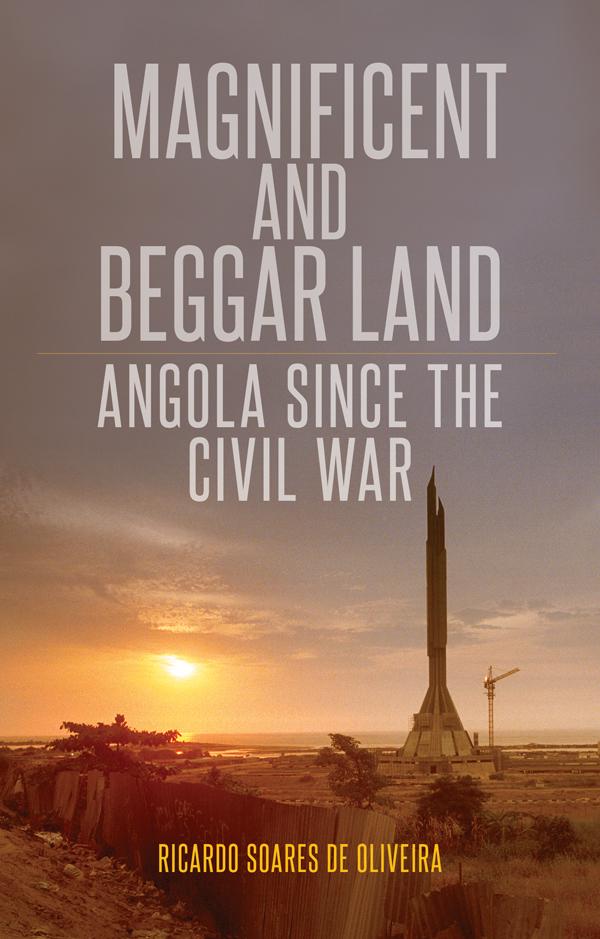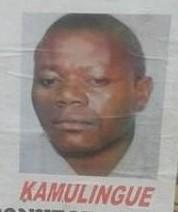Magnificent & Beggar Land: Angola Since the Civil War – By Ricardo Soares de Oliveira

 Reviewed by Lara Pawson – Reading this book, I began to wonder if its author is, in fact, the real-life incarnation of HG Well’s Griffin. If he is not The Invisible Man, how on earth does Ricardo Soares de Oliveira seduce his sources into speaking with such candour? For we are not talking about vox pops plucked randomly from the streets of Angola’s capital, Luanda, or the views of a taxi-driver jotted down during a conversation in one of the city’s now notorious traffic jams. No, what makes Magnificent and Beggar Land so admirable is that it is packed with information, anecdotes, criticisms and even regrets gleaned from the upper layer of the notoriously secretive party that has ruled Angola for the past 40 years, the Movimento Popular de Libertaí§í£o de Angola (MPLA).
Reviewed by Lara Pawson – Reading this book, I began to wonder if its author is, in fact, the real-life incarnation of HG Well’s Griffin. If he is not The Invisible Man, how on earth does Ricardo Soares de Oliveira seduce his sources into speaking with such candour? For we are not talking about vox pops plucked randomly from the streets of Angola’s capital, Luanda, or the views of a taxi-driver jotted down during a conversation in one of the city’s now notorious traffic jams. No, what makes Magnificent and Beggar Land so admirable is that it is packed with information, anecdotes, criticisms and even regrets gleaned from the upper layer of the notoriously secretive party that has ruled Angola for the past 40 years, the Movimento Popular de Libertaí§í£o de Angola (MPLA).
On a trip to a brand new industrial park, the Zona Económica Especial (ZEE), on the outskirts of the capital, a senior MPLA figure under Soares de Oliveira’s charm reveals how insiders make money even before the zone has started producing anything. “[M]any of the factories were bought second hand, already obsolete,” the source says. They were “extremely expensive” and “tied to equally expensive management contracts as we can’t run them ourselves”.
Another senior figure admits that the Israeli defence contractor LR Group, which played a crucial role in defeating the rebel army of Unií£o Nacional para a Independíªncia Total de Angola (Unita) during the final years of the civil war, “were [practically] running the army”. In another discussion, this one about the chances of a brighter future for the impoverished majority, a former minister bluntly tells the author: “most people [in the summit of the party] have no sense of urgency; Angola has so much money, they think they can make mistakes and start all over again [and still] come out on top”.
To those who are not familiar with Angola, these examples may seem unremarkable. But anyone who has tried to get information out of the country or access the upper echelons of the MPLA will be impressed. A hardened foreign correspondent once admitted to me that the one place they’d given up trying to report on was Angola: “No one will speak to you. It’s impossible.” More recently, as Soares de Oliveira notes, it has become easier to conduct research. Nevertheless, accessing anyone with any power still requires a certain skill. Persuading them to say what they actually think – not simply to spout the party line – requires a certain miracle. Soares de Oliveira achieves this again and again. His book is testimony to a commitment to building relationships and a willingness to listen. We should salute him.
We might also recognise how well he writes. Were it not for his name, you would never guess that English is the author’s second or even third language (he is fluent in French too). His efficiency with words allows him to squeeze masses of detail into just over 200 pages. It is with some sense of shame, therefore, that this review can offer but a glimpse of his excellent investigation.
Stripped to its essentials, Magnificent and Beggar Land explores the extraordinary transformation of the Angolan political economy after 41 years of war finally ended. “[S]ince 2002, for a variety of reasons, the country has reinvented itself,” said Soares de Oliveira in a recent interview with Portuguese newspaper, Observador. “I wanted to work out to what extent this [reinvention] really had taken place, or whether there are continuities in relation to the structures of inequality and underdevelopment that existed not only in the context of civil war, but also during the colonial period.”
From one angle, the author writes, “the last decade seems little more than a new configuration of Angola’s perennial role as a commodity producer on the periphery of the world economy.” Whilst Angola was crowned the world’s fastest growing economy for the first years of the millennium, Soares de Oliveira predicts that those growth rates are “probably gone forever”. Oil, moreover, still represents about 95% of the country’s total exports with little evidence of any real diversification taking place. More pessimistic still, “the only opposition party capable of unseating the MPLA is the oil barrel”. So says the author’s friend, the Portuguese-based economist who grew up in Angola, Manuel Ennes Ferreira. For seasoned Angola-watchers, these facts and feelings are familiar. Yet, the devil – take that as literally as you like – really is in the detail.
If I was told that Soares de Oliveira had interviewed every person who has done business in Luanda during the last 25 years, I’d believe it. To illustrate his arguments, he cites, among myriad others, the owner of a detergent factory and digs up statistics from a former ice-cream maker who went into diamonds. He winkles words from all sorts of fawning foreigners – be they diplomats, so-called consultants or hard-nosed finance folk. He references US State Department documents released on Wikipedia to remind us of allegations that Hezbollah used Angolan front companies to finance its operations. The examples he uses to illustrate the speed of the country’s transformation sometimes reduced this reader to giggles.
In his chapter, ‘Oligarchic Capitalism, Angola-Style’, Soares de Oliveira invites us to imagine a time when people still assumed that business and politics were at least nominally autonomous. “In view of later developments, it is hard to convey,” he writes, drily, “the frisson caused in the Luanda society of the early 1990s when it was reported that the president’s wife, Ana Paula dos Santos, owned a shoe shop and a hairdressing salon.” This conjures an idea of a place that was almost adorable. Not any more.
Bouncing off his ground-breaking 2007 paper about the national oil company, Sonangol, Soares de Oliveira takes us even deeper into the expansion of what was (until the latest oil-price crash) Africa’s second biggest corporation and has, since independence, been the heart pumping the blood of the MPLA. He explains meticulously how the parallel financing system operates and how President José Eduardo dos Santos has intensified his power and reputation not only domestically, but around the globe. He shows us that the phenomenal leaps the country has made – in terms of its international standing, its macro-economic figures and the architectural remodelling of Luanda – are, to their very core, the product of an MPLA vision.
“This book,” he states, referencing the defeat of Unita in 2002, “is about what the victors did with this power: the Angola they imagined and tried to bring into existence.” It is, and always was, he argues, a very “modernist” vision. On this point, we encounter a crack in what is otherwise a very fine book.
Despite making regular references to the “modern” and “modernity”, Soares de Oliveira does not define adequately what he – nor indeed the MPLA – might mean by such totalising terms. My understanding from the book is that they double for “˜European-ness’ with shades of the Emirates chucked in. In a footnote, James Scott’s 1998 definition of “˜high modernism’ is cited; in other words, the use of science and technology to reorder the social and natural world.
Of course, Euro-American modernity has produced a very specific ‘re-ordering’ of the world through a most brutal violence, including the trans-Atlantic slave trade, colonialism, and ethnic cleansing both at home and abroad. In a bloody and traumatic way, this history is what stitches Angola to Europe’s troubling traditions and its so-called enlightenment. Soares de Oliveira does not ignore this: his opening chapter provides a useful summary of that history and its specific relationship to the MPLA’s own. This reader, however, would have liked to have seen him consider the theoretical debates that have raged around the concept of modernity and the idea of modernisation, perhaps particularly from the perspective of certain black intellectuals. This might also open up another crucial discussion concerning the role of the larger Angolan public, the millions still living in appalling poverty, and yet whose labours, lives and loves are, undoubtedly, what really makes the country so magnificent.
Since finishing this excellent book, one particular idea has rooted firmly in my head. It stems from a moment in the chapter, ‘The Spectacle of Reconstruction’, when our attention is focused on Luanda’s version of the Copacabana. Quoting from a magazine that is describing the ocean-front project, we are told, “The future is happening in full view for everyone to see”. This poetic observation is uncanny. Looking at Angola often feels like you are looking at the whole world through a microscope. This magnificent and beggar land has everything we have – from unfettered consumption to a blind thirst for oil, a contempt for the poor, a long-established racialised hierarchy and a growing sense of frustration among the young. The point is that as extreme as Angola certainly can be, the more you look and the closer you get, the sharper you see your own reflection and the future facing us all.
Lara Pawson is a freelance writer who lives in east London. She is the author of In the Name of the People: Angola’s Forgotten Massacre





